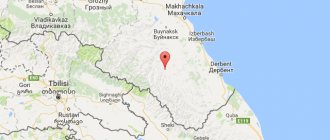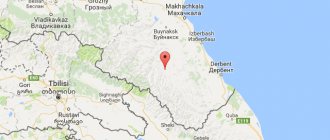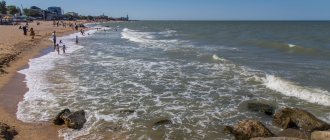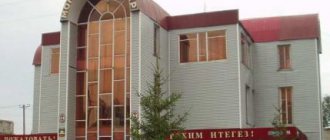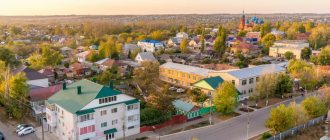This article is about the city. For the urban district, see Urban district of the city of Izberbash.
| City Izberbash Coat of arms |
| A country | Russia, Russia |
| Subject of the federation | DagestanDagestan |
| Urban district | Izberbash city |
| Coordinates | 42°34′00″ n. w. 47°52′00″ E. d. / 42.56667° n. w. 47.86667° E. d. / 42.56667; 47.86667 (G) [www.openstreetmap.org/?mlat=42.56667&mlon=47.86667&zoom=12 (O)] (Z)Coordinates: 42°34′00″ N. w. 47°52′00″ E. d. / 42.56667° n. w. 47.86667° E. d. / 42.56667; 47.86667 (G) [www.openstreetmap.org/?mlat=42.56667&mlon=47.86667&zoom=12 (O)] (I) |
| Based | 1932 |
| Former names | Izberg |
| City with | 1949 |
| Square | 22.55 [1]km² |
| Population | ↗57,511[2] people (2016) |
| National composition | Dargins, Kumyks, Lezgins, etc. |
| Confessional composition | Muslims, Christians |
| Names of residents | Izberbashians, Izberbashets |
| Timezone | UTC+3 |
| Telephone code | +7 87245 |
| Postcode | 368500 |
| Vehicle code | 05 |
| OKATO code | [classif.spb.ru/classificators/view/okt.php?st=A&kr=1&kod=82415 82 415] |
| Official site | [www.mo-izberbash.ru/ izberbash.ru] |
| Izberbash Moscow |
| Makhachkala Izberbash Izberbash |
K: Settlements founded in 1932
Izberbash
(darg. kum. Lezg. Avar. Izberbash; also Lezg. Izberg) - a city (since 1949) in Russia, republican subordination in Dagestan. The name “Yiz Bir Bash” is translated from Kumyk as “Trace of one head” (meaning translation: the beginning of the border). In 2005, Izberbash took first place in the competition for the most comfortable city in Russia in the category of cities with a population of up to 100 thousand inhabitants[3]. Izberbash is known primarily as a city of oil workers, but currently it is actively developing its significant resort and recreational potential[4][5].
Geographical position
The city arose in connection with the development of oil fields on the shelf of the Caspian Sea and is located on its shore 56 km south of Makhachkala. The city is located on the Caspian lowland and stretches from northwest to southeast along the coastline of the Caspian Sea for more than 10 km. From the north and west, the valley in which the city lies is bordered by low chains of the foothills of the Greater Caucasus. Mount Izberg-Tau rises above the city, revealing traces of wind erosion. Distance from Moscow by rail is 2,145 km. The distance to the Samur post on the border with Azerbaijan is 125 km, to Baku - 329 km.
How to get there
Unfortunately, it is not possible to get to Izberbash without transfers. In any case, you first need to get to Makhachkala. The easiest way to do this from Moscow is by plane or train. Several flights operate daily to Makhachkala Airport. Flight time: 2 hours 30 minutes.
You can also travel from Moscow to Makhachkala by train. The train departing from the Kazansky station at 21:12 arrives at its destination the next day at 12:35. A ticket for a reserved seat carriage will cost 2425 RUB, for a compartment carriage - 4150 RUB. Prices on the page are for March 2021.
The distance from Makhachkala to Izberbash is only 56 km. There are many trains, buses and minibuses running between the cities. Travel by bus costs 150 RUB, by train - 63 RUB.
Climate
The climate of Izberbash is transitional from temperate semiarid to subtropical semi-arid[6]. The climate is strongly influenced by the Caspian Sea, due to which autumn is long and warm, and spring comes with a delay. Winters are mild, snow lasts only two weeks a year, the coldest month is usually February. Summer is long and hot[7].
The average annual temperature in Izberbash is positive: +12.7°C, the average monthly temperature in January is +0.8°C (minimum -17°C), the average monthly temperature in July is +24.0°C (maximum +37.7°C). The duration of the warm period is 270 days. Precipitation averages 260 mm per year; the rainiest month is October (46 mm)[8]. The average annual relative air humidity is 69.5%, the average wind speed is 5.0 m/s.
Entertainment and attractions
As in any more or less large city, there is a Museum of Local Lore in Izberbash. Although it received this status relatively recently, in 2001. Before that, for more than 30 years, the museum worked exclusively on a voluntary basis, thanks to the employees of the regional department of culture.
Today, the funds of this institution include more than 3,200 exhibits. Some of them are presented in the exhibition halls and tell about the history and development of Izberbash. The museum's departments are dedicated to the Great Patriotic War and its veterans, natives of Dagestan, honored people who worked in the post-war years. Part of the exhibition is dedicated to ancient settlements that were once located on the site of today's Izberbash.
Another stronghold of culture in the city is the Dargin Drama Theater, which stages both classical performances and plays by Dagestan playwrights.
In Izberbash there is a public bath with water from a local hydrogen sulfide spring, which has healing properties and helps get rid of skin and gastrointestinal diseases. The bathhouse is divided into men's and women's, and there are comfortable changing rooms.
By the way, Izberbash is translated from Kumyk as “Trace of one head.” Most likely, the meaning of these words indicated the border position of the city. However, next to Izberbash there really is a head, or rather its silhouette. A number of Izberg-Tau rocks, overlapping each other, are very similar to the silhouette of Alexander Sergeevich Pushkin.
According to legend, such a striking similarity was first noticed by the writer Alexandre Dumas, who visited these places during his trip to the Caucasus.
Recreational infrastructure
The main beach of Izberbash is located at the end of Ushakova Street. It is quite long (about 3 kilometers long) and quite wide (200 meters wide). The local sand has a fine-grained structure, mixed in places with shells. Natural stone ridges act as natural breakwaters and protect the beach quite well from surge waves[9]. There are usually no storms or hurricanes in the Izberbash area. The depth of the sea also decreases gradually: the sea reaches a depth of 1.5 m approximately 70 meters from the coastline[10].
The beach has all the necessary infrastructure: there are changing cabins, sun canopies, benches and trash cans. There are also showers with thermal water on the beach. The sand is regularly sifted with a sand cleaning combine. Rescue stations are also equipped. Near the beach there are two asphalt parking lots for easy access to its territory. Passenger cars are parked on the lower platform, while the upper one is for minibuses.
Administration
The city of Izberbash is located on the Caspian lowland, on the picturesque coast of the Caspian Sea, 65 km south of the capital of the Republic of Dagestan, Makhachkala, on a strip of plain (up to 4.5 km) between the sea and the Izberg-Tau mountain, connecting Northern and Southern Dagestan, near the spurs Greater Caucasus. Since ancient times, this strip served as a trade caravan route and one of the directions of the great route. Federal railways and highways pass through the city. Izberg railway station was built in 1900 (currently Izberbash station).
Izberbash is a multinational city, the population is about 60 thousand people. Mostly Dargins, Kumyks, Lezgins, and Russians live here.
Natural conditions are characterized by short, not cold and windy winters with a minimum temperature in January of up to -17 degrees Celsius, and hot summers with a maximum temperature in July of up to + 37.7 degrees. The average annual temperature is +13 degrees Celsius. The predominant wind direction is northwest, less often southeast. Average wind speed is 5 m/s. Precipitation per year ranges from 200 to 400 mm. Natural resources include oil, gas, thermal waters, and limestone.
Among the representatives of the animal world, hedgehogs and turtles live within the city, and there are snakes and rodents. The sea is home to valuable species of fish: sturgeon, beluga, stellate sturgeon, kutum, mullet, herring and others; endemic Caspian seals live on the coastal ridges.
The history of the settlement begins in 1931, when the first tent was erected near the station by workers who were conducting preparatory work for the development of oil fields.
In 1932, by order of the People's Commissar of Heavy Industry of the country, Sergo Ordzhonikidze, all geological exploration work for oil and gas in Dagestan was entrusted to the Grozneft trust, whose geological service was headed by I.O. Brod, in the future - head. Department of Moscow State University, which has done a lot for the study and development of the oil regions of Dagestan.
In 1935, the first exploration wells revealed the commercial oil and gas potential of the Achi-su area, and a number of exploration wells were drilled in Izberbash. By order of the Grozneft trust dated May 9, 1935, the Dagneftegazrazvedka office was organized, which included the exploration areas: Izberbash, Achi-su, Uytash, Kayakent, Khoshmenzil.
And on April 12, 1936, exploration well No. 8 - Izberbash produced the first commercial oil with a flow rate of 250 tons per day from a depth of 1650 m from the Chokrak sediments. The discovery of an oil field in Izberbash marked the beginning of the emergence and development of an oil field, which gave birth first to a workers' village, and then to a city - the first-born of the oil industry of Dagestan.
Industry professionals from Izberbash made a great contribution to the development of the oil and gas industry: brothers G. and M. Azizov, Sh. Abdulmukminov, M. Akayev, A. Ali-Ada, M. Abeydullaev, N. Valovoy, M. Gadzhiev, I. Gunashev , Kh. Klychev, B. Magomedov, E. Ozerina, A. Saidov, S. Sovzikhanov, I. Ermurzaev, I. Kurbanov, M. Magomedov and many others.
Subsequently, the main oil pipeline “Grozny-Makhachkala-Achisu-Izberbash-Dagestan Ogni-Derbent” was built.
By Decree of the Presidium of the Supreme Soviet of the RSFSR No. 761/5 dated June 1, 1950, on the proposal of the Supreme Council of the DASSR dated April 2, 1948. Izberbash was transformed into a city of republican subordination.
For many years, Izberbash was rightfully considered a city of oil workers and machine builders. On the basis of repair and mechanical workshops for servicing oil fields here, in the post-war years, a powerful city-forming enterprise “Dag ZETO ” for the production of thermal furnaces was created, which became the head enterprise in the Dagelektroterm VPO system.
In place of swamps and swamps, the young city of Dagestan, Izberbash, now stretches along the shore of the Caspian Sea. It continues to be built. The city streets, sidewalks, squares and alleys have high-quality improved coating. Dozens of multi-storey and many beautiful individual residential buildings, industrial enterprises and cultural institutions, hotels, and recreation centers have been built on the shores of the Caspian Sea.
The city has the State Musical and Drama Theater named after O. Batyrai, the Palace of Culture, a cinema, and a local history museum.
Mechanical engineers have mastered and are producing a number of consumer goods. More than a dozen large and medium-sized enterprises operate and produce food and light industry products, among them there are already widely known enterprises in the republic and Russia, such as: CJSC "Wine-Cognac", LLC "Confectionery Factory" Dagintern, LLC "Novopak", LLC " Eurasia", LLC "Kolos", garment factory named after Imam Shamil, etc.
Izberbash residents have taken and are taking an active part in the life of the country. They helped to harvest a rich virgin harvest, built the Baikal-Amur Mainline, the Chirkey hydroelectric power station, participated in the liquidation of the consequences at the Chernobyl nuclear power plant, and helped victims of devastating earthquakes in Armenia and other regions of the country. And now many oil specialists from Izberbash work in other cities and regions of Russia and abroad, where oil and gas are produced.
The name of the city has a special history. According to one version, until 1895, the territory where the city is located was a deserted, swampy place. The Germans, who were building a railway through the territory of the present city, paid attention to the mountain that forms the profile of a person, and said that work was being carried out in the area where there was a mountain (Das istberg). So the railway station was named Eastberg (Izberg). A series of rocks of the Izberg-Tau mountain, at an altitude of 150 meters above sea level, overlapping each other form a resemblance to the silhouette of Alexander Sergeevich Pushkin, which was first noticed by the famous French writer Alexandre Dumas, who was traveling on a stagecoach to Derbent while traveling through the Caucasus. Local residents added “bash” to the word “Izberg”, which means head, and the village began to be called Izberbash.
Story
Russian archives contain data on the existence on the territory of modern Izberbash of the historical settlement of Ullu-Izbar in the region of Mount Izberg, which arose in the 17th century and was repeatedly destroyed and rebuilt during wars. Mention of it, for example, is present in the “Marching Journal of 1722” by Peter I[7].
The first modern workers' settlement appeared here in 1931. In 1935, the first large oil wells began to be developed here. Izberbash received city status on June 28, 1949[7]. Since then, the city's population has been continuously increasing.
Where to stay
The vast majority of tourists visiting Izberbash go to the Priboi tourist center. The base has cozy rooms of varying degrees of comfort. Each room has air conditioning, TV, refrigerator, and Wi-Fi. “Priboy” has its own beach, next to which there are gazebos, sun loungers, a bar, sports grounds, catamaran and boat rentals. Cost of a double room: 2200 RUB per day.
There are also several small hotels in the city: “Caspian”, “Izberbash”, “Cassiopeia”. Accommodation cost: 1500-4000 RUB per day.
Economy
- plant of electrothermal equipment "DagZETO"
- radio plant named after Pleshakova P. S.
- "Sewing factory named after. I. Shamil"
- Izberbashneft, Residual oil production
- filter equipment plant
- State Unitary Enterprise "Printing No. 6"
- confectionery factory "Dagintern"
- confectionery factory "Eurasia"
- "Izberbash Gormol"
- production of nectars and juices "Novopack"
- CJSC "Wine-Cognac"
- recreation based on the sea coast
Provided by the portal https://vizit3d.ru
Izberbash (Material from Wikipedia - the free encyclopedia)
| Russia, Russia | |
| Subject of the federation | DagestanDagestan |
| Coordinates | Coordinates: 42°34′00″ N. w. 47°52′00″ E. d. / 42.566667° n. w. 47.866667° E. etc. links to maps (Google) (Openstreet) (Yandex) Show geographic map42.566667, 47.86666742°34′00″ s. w. 47°52′00″ E. d. / 42.566667° n. w. 47.866667° E. d. (G) (O) (I) |
| Based | 1932 |
| Former names | Izberg |
| City with | 1949 |
| Square | 22.55 [1]km² |
| Population | ↗55,919[2] people (2012) |
| National composition | Dargins (65.4%), Kumyks (14.4%), Lezgins (7.25%), Russians (5.2%), Avars (2.8%), Laks (2.0%), 2002 .[3] |
| Confessional composition | Muslims, Christians |
| Ethnobury | Izberbashians, Izberbashets |
| Timezone | UTC+4 |
| Telephone code | +7 87245 |
| Postcode | 368500 |
| Vehicle code | 05 |
| OKATO code | 82 415 |
| Official site | https://www.mo-izberbash.ru/ |
Izberbash
(darg. kum. Lezg. Avar. Izberbash [
source not specified 183 days
]) - a city (since 1949) in Russia, republican subordination in Dagestan. The name is translated from Kumyk as “Trace of one head” (meaning translation: the beginning of the border). In 2005, Izberbash took first place in the competition for the most comfortable city in Russia in the category of cities with a population of up to 100 thousand inhabitants[4].
General information [edit]
The city arose in connection with the development of oil fields on the shelf of the Caspian Sea and is located on its shore 56 km south of Makhachkala. The head of the city district is Suleymanov Abdulmedzhid Valibagandovich (since 2008).
Population [edit]
Ethnic composition of the city’s population with subordinate settlements according to the 2002 :[3]
| People | Number of people, people | Share of the total population, % |
| Dargins | 26 974 | 65,37 % |
| Kumyks | 5 889 | 14,37 % |
| Lezgins | 3 973 | 7,25 % |
| Russians | 2 109 | 5,15 % |
| Avars | 1 128 | 2,75 % |
| Laktsy | 835 | 2,03 % |
| Azerbaijanis | 395 | 0,96 % |
| Tabasarans | 288 | 0,70 % |
| Aguly | 135 | 0,33 % |
| Other nationalities | 442 | 1,08 % |
| Total | 40 987 | 100,00 % |
Estimated national composition of the population for ~ 2009 :[5]
| People | Number of people, people | Share of the total population, % |
| Dargins | 33 109 | 64,85 |
| Kumyks | 7 556 | 14,8 |
| Lezgins | 3 814 | 7,47 |
| Russians | 2 701 | 5,29 |
| Avars | 1 307 | 2,56 |
| Laktsy | 975 | 1,91 |
| Azerbaijanis | 505 | 0,99 |
| Tabasarans | 368 | 0,72 |
| Other nationalities | 720 | 1,41 |
| Total | 51 055 | 100,0 |
| 1970 | 17,3[7] |
| 1979 | 22,4[8] |
| 1989 | 28,1 |
| 2002 | 39,4 |
| 2008 | 50,8 |
| 2009 | 51,2 |
Izberbash is famous for the Pushkin-Tau mountain, the slope of which resembles the profile of A.S. Pushkin.
In Izberbash, for the first time in the world, an integrated method was used to extract oil from under the seabed by building overpasses and drilling inclined wells from the shore.[9]
Economics [edit]
Entrance to Izberbash
- plant of electrothermal equipment "DagZETO"
- radio plant named after Pleshakova P. S.
- "Sewing factory named after. I. Shamil"
- Izberbashneft, Residual oil production
- filter equipment plant
- State Unitary Enterprise "Printing No. 6"
- confectionery factory "Dagintern"
- confectionery factory "Eurasia"
- "Izberbash Gormol"
- production of nectars and juices "Novopack"
- CJSC "Wine-Cognac"
- recreation based on the sea coast
Culture [edit]
- Dargin Drama Theater
Notes [edit]
- Calculated from the database of municipalities of the Russian Federation for 2008
- Table 35. Estimated resident population as of January 1, 2012
- ↑ 12
Ethnic composition of the population of Dagestan. 2002 - The most comfortable city in Russia
- Union of Small Towns of the Russian Federation - Izberbash - attractions and enterprises, famous natives and economic indicators of the city of Izberbash
- USSR Population Census 1959
- USSR Population Census 1970
- USSR Population Census 1979
- Origin and production of oil. Network Encyclopedia.. Archived from the original on February 14, 2012.
Links to local sites (municipal and general)
| Dagestan | |||
| Administrative center : Districts : Agulsky | Akushinsky | Akhvakhsky | Akhtynsky | Babayurtovsky | Bezhtinsky | Botlikhsky | Buynaksky | Gergebilsky | Gumbetovsky | Gunibsky | Dakhadaevsky | Derbent | Dokuzparinsky | Kazbekovsky | Kaitagsky | Karabudakhkent | Kayakent | Kizilyurt | Kizlyarsky | Kulinsky | Kumtorkalinsky | Kurakhsky | Laksky | Levashinsky | Magaramkent | Novolaksky | Nogai | Rutulsky | Sergokalinsky | Suleiman-Stalsky | Tabasaran | Tarumovsky | Tlyaratinsky | Untsukulsky | Khasavyurtovsky | Khivsky | Khunzakh | Tsumadinsky | Tsuntinsky | Charodinsky | Shamilsky Articles : Geography | Coat of arms | Anthem | History | Population | Administrative division | Flag | |||
Source - “https://ru.wikipedia.org/w/index.php?title=Izberbash&oldid=55881576”
- Settlements in alphabetical order
- Settlements founded in 1932
- Izberbash
- Cities founded in the 20th century
- Former urban-type settlements of Dagestan
- Former regional centers of Dagestan
Hidden categories:
- Wikipedia: No sources since January 2013
- Wikipedia: Articles with statements without sources more than 14 days
- Unfinished articles on the geography of Dagestan
- This page was last modified: 18:06, 30 May 2013.
- The text is available under a Creative Commons Attribution-ShareAlike license; In some cases, additional conditions may apply. See Terms of Use for details. Wikipedia® is a registered trademark of the Wikimedia Foundation, Inc.
Notes
- [www.gks.ru/dbscripts/munst/munst82/DBInet.cgi Calculated from the database of municipalities of the Russian Federation for 2008]
- ↑ 12
www.gks.ru/free_doc/doc_2016/bul_dr/mun_obr2016.rar Population of the Russian Federation by municipalities as of January 1, 2016 - [www.mvk.ru/about/press/news/news_585.shtm The most comfortable city in Russia]
- www.mo-izberbash.ru/images/dokumenti/pdf/%D0%92%D0%BE%D0%B4%D0%BE%D1%81%D0%BD%D0%B0%D0%B1%D0%B6 %D0%B5%D0%BD%D0%B8%D0%B5%20%D0%92%D0%BE%D0%B4%D0%BE%D0%BE%D1%82%D0%B2%D0%B5 %D0%B4%D0%B5%D0%BD%D0%B8%D1%8F%20%D0%98%D0%B7%D0%B1%D0%B5%D1%80%D0%B1%D0%B0 %D1%88.pdf
- [fb.ru/article/240171/gorod-izberbash-otdyih-na-more-variantyi-razmescheniya-i-razvlecheniya-dlya-turistov City of Izberbash: seaside holidays, accommodation options and entertainment for tourists]
- ru.climate-data.org/location/29395/
- ↑ 123
[tochka-na-karte.ru/Goroda-i-Gosudarstva/685-Izberbash.html Izberbash, city - Dagestan - Russia] - www.vokrugsveta.ru/encyclopedia/index.php?title=%D0%98%D0%B7%D0%B1%D0%B5%D1%80%D0%B1%D0%B0%D1%88
- [www.izberbash-online.ru/about/special/gorodskoj-pljazh.html City beach - Izberbash Republic of Dagestan]
- [turizm.sputnik.ru/items/gorodskoyplyag-izberbasha City beach of Izberbash, Izberbash. Beaches. Satellite / Tourism]
- [demoscope.ru/weekly/ssp/rus59_reg2.php All-Union Population Census of 1959. The size of the urban population of the RSFSR, its territorial units, urban settlements and urban areas by gender] (Russian). Demoscope Weekly. Retrieved September 25, 2013. [www.webcitation.org/6GDOghWC9 Archived from the original on April 28, 2013].
- ↑ 123456789101112
www.MojGorod.ru/r_dagestan/izberbash/index.html People's encyclopedia “My City”. Izberbash - [demoscope.ru/weekly/ssp/rus70_reg2.php All-Union Population Census of 1970 The size of the urban population of the RSFSR, its territorial units, urban settlements and urban areas by gender.] (Russian). Demoscope Weekly. Retrieved September 25, 2013. [www.webcitation.org/6GDOiMstp Archived from the original on April 28, 2013].
- [demoscope.ru/weekly/ssp/rus79_reg2.php All-Union Population Census of 1979 The size of the urban population of the RSFSR, its territorial units, urban settlements and urban areas by gender.] (Russian). Demoscope Weekly. Retrieved September 25, 2013. [www.webcitation.org/6GDOjhZ5L Archived from the original on April 28, 2013].
- [demoscope.ru/weekly/ssp/rus89_reg2.php All-Union Population Census of 1989. Urban population]. [www.webcitation.org/617x0o0Pa Archived from the original on August 22, 2011].
- [www.perepis2002.ru/ct/doc/1_TOM_01_04.xls All-Russian Population Census 2002. Volume. 1, table 4. Population of Russia, federal districts, constituent entities of the Russian Federation, districts, urban settlements, rural settlements - regional centers and rural settlements with a population of 3 thousand or more]. [www.webcitation.org/65AdCU0q3 Archived from the original on February 3, 2012].
- [www.gks.ru/bgd/regl/B09_109/IssWWW.exe/Stg/d01/tabl-21-09.xls Number of permanent population of the Russian Federation by cities, urban-type settlements and districts as of January 1, 2009]. Retrieved January 2, 2014. [www.webcitation.org/6MJmu0z1u Archived from the original on January 2, 2014].
- [dagstat.gks.ru/wps/wcm/connect/rosstat_ts/dagstat/resources/b698fa00421f084fbfb3ff2d59c15b71/VPN+vol1.rar All-Russian population census 2010. Table No. 11. Population of urban districts, municipal districts, urban and rural settlements, urban and rural settlements of the Republic of Dagestan]. Retrieved May 13, 2014. [www.webcitation.org6PXLnySO Archived from the original on May 13, 2014].
- [www.gks.ru/free_doc/doc_2012/bul_dr/mun_obr2012.rar Population of the Russian Federation by municipalities. Table 35. Estimated resident population as of January 1, 2012]. Retrieved May 31, 2014. [www.webcitation.org/6PyOWbdMc Archived from the original on May 31, 2014].
- [www.gks.ru/free_doc/doc_2013/bul_dr/mun_obr2013.rar Population of the Russian Federation by municipalities as of January 1, 2013. - M.: Federal State Statistics Service Rosstat, 2013. - 528 p. (Table 33. Population of urban districts, municipal districts, urban and rural settlements, urban settlements, rural settlements)]. Retrieved November 16, 2013. [www.webcitation.org/6LAdCWSxH Archived from the original on November 16, 2013].
- [dagstat.gks.ru/wps/wcm/connect/rosstat_ts/dagstat/resources/2b0901004382ea27a3cef3dd898fc419/Population+on+1+January+2014+by+rural+settlements.xls Population as of January 1, 2014 rural settlements of the Republic of Dagestan]. Retrieved April 17, 2014. [www.webcitation.org/6OuE6Kx3V Archived from the original on April 17, 2014].
- [www.gks.ru/free_doc/doc_2015/bul_dr/mun_obr2015.rar Population of the Russian Federation by municipalities as of January 1, 2015]. Retrieved August 6, 2015. [www.webcitation.org/6aaNzOlFO Archived from the original on August 6, 2015].
- taking into account the cities of Crimea
- [www.gks.ru/free_doc/doc_2016/bul_dr/mun_obr2016.rar Population of the Russian Federation by municipalities as of January 1, 2016. Table “31. Population of cities and towns by federal districts and constituent entities of the Russian Federation as of January 1, 2016.” RAR archive (1.0 MB)]
- [dagstat.gks.ru/wps/wcm/connect/rosstat_ts/dagstat/resources/cafa4e00421f0cb8805fcc2d59c15b71/%D0%92%D0%9F%D0%9D+%D1%82%D0%BE%D0%BC3.rar VPN results- 2010 for Dagestan. Volume 3]
- [www.barrell.ru/geologicalrun/geologicalrun2.html Origin and production of oil. Network Encyclopedia]. [www.webcitation.org/65R4UfiKV Archived from the original on February 14, 2012].
Demography
Ethnic groups in the city's administrative area (2002 census):[11]
- Dargins (65.4%)
- Kumyks (14.4%)
- Lezgins (7.3%)
- Russians (5.1%)
- Avars (2.8%)
- Laks (2.0%)
- Azerbaijanis (1.0%)
Ethnic groups in the city itself (2002 census):[12]
- Dargins (64.9%)
- Kumyks (14.8%)
- Lezgins (7.5%)
- Russians (5.3%)
- Avars (2.6%)
- Lucky (1.9%)
- Azerbaijanis (1.0%)
Excerpt characterizing Izberbash
It was already dark, and Pierre could not make out the expression that was on Prince Andrei’s face, whether it was angry or tender. Pierre stood silently for some time, wondering whether to follow him or go home. “No, he doesn’t need it! “Pierre decided to himself, “and I know that this is our last date.” He sighed heavily and drove back to Gorki. Prince Andrey, returning to the barn, lay down on the carpet, but could not sleep. He closed his eyes. Some images were replaced by others. He stopped at one for a long time, joyfully. He vividly remembered one evening in St. Petersburg. Natasha, with a lively, excited face, told him how last summer, while out picking mushrooms, she got lost in a large forest. She incoherently described to him the wilderness of the forest, and her feelings, and conversations with the beekeeper whom she had met, and, interrupting every minute in her story, she said: “No, I can’t, I’m not telling it like that; no, you don’t understand,” despite the fact that Prince Andrei reassured her, saying that he understood, and really understood everything she wanted to say. Natasha was dissatisfied with her words - she felt that the passionately poetic feeling that she experienced that day and which she wanted to turn out did not come out. “This old man was such a charm, and it was so dark in the forest... and he was so kind... no, I don’t know how to tell,” she said, blushing and worried. Prince Andrey smiled now with the same joyful smile that he smiled then, looking into her eyes. “I understood her,” thought Prince Andrei. “Not only did I understand, but this spiritual strength, this sincerity, this spiritual openness, this soul of hers, which seemed to be connected by her body, I loved this soul in her... I loved her so much, so happily...” And suddenly he remembered about how his love ended. “He didn’t need any of this. He didn't see or understand any of this. He saw in her a pretty and fresh girl, with whom he did not deign to throw in his lot. And I? And he is still alive and cheerful.” Prince Andrei, as if someone had burned him, jumped up and began to walk in front of the barn again. On August 25, on the eve of the Battle of Borodino, the prefect of the palace of the French Emperor, Mr. de Beausset, and Colonel Fabvier arrived, the first from Paris, the second from Madrid, to Emperor Napoleon in his camp near Valuev. Having changed into a court uniform, Mr. de Beausset ordered the parcel he had brought to the emperor to be carried in front of him and entered the first compartment of Napoleon's tent, where, talking with Napoleon's adjutants who surrounded him, he began to uncork the box. Fabvier, without entering the tent, stopped, talking with familiar generals, at the entrance to it. Emperor Napoleon had not yet left his bedroom and was finishing his toilet. He, snorting and grunting, turned now with his thick back, now with his overgrown fat chest under the brush with which the valet rubbed his body. Another valet, holding the bottle with his finger, sprinkled cologne on the emperor’s well-groomed body with an expression that said that he alone could know how much and where to spray the cologne. Napoleon's short hair was wet and tangled over his forehead. But his face, although swollen and yellow, expressed physical pleasure: “Allez ferme, allez toujours...” [Well, even stronger...] - he said, shrugging and grunting, to the valet who was rubbing him. The adjutant, who entered the bedroom in order to report to the emperor about how many prisoners were taken in yesterday's case, having handed over what was needed, stood at the door, waiting for permission to leave. Napoleon, wincing, glanced from under his brows at the adjutant. “Point de prisonniers,” he repeated the adjutant’s words. – Il se font demolir. “Tant pis pour l’armee russe,” he said. – Allez toujours, allez ferme, [No prisoners. They force themselves to be exterminated. So much the worse for the Russian army. Well, even more, well, stronger...] - he said, hunching his back and exposing his fat shoulders. - C'est bien! Faites entrer monsieur de Beausset, ainsi que Fabvier, [Good! Let de Bosset come in, and Fabvier too.] - he said to the adjutant, nodding his head. - Oui, Sire, [I'm listening, sir.] - and the adjutant disappeared through the door of the tent. Two valets quickly dressed His Majesty, and he, in a blue guards uniform, walked out into the reception room with firm, quick steps. At this time, Bosse was hurrying with his hands, placing the gift he had brought from the Empress on two chairs, right in front of the Emperor’s entrance. But the emperor got dressed and went out so unexpectedly quickly that he did not have time to fully prepare the surprise. Napoleon immediately noticed what they were doing and guessed that they were not yet ready. He didn't want to deprive them of the pleasure of surprising him. He pretended not to see Monsieur Bosset and called Fabvier over to him. Napoleon listened, with a stern frown and in silence, to what Fabvier told him about the courage and devotion of his troops, who fought at Salamanca on the other side of Europe and had only one thought - to be worthy of their emperor, and one fear - not to please him. The result of the battle was sad. Napoleon made ironic remarks during Fabvier's story, as if he did not imagine that things could go differently in his absence. “I must correct this in Moscow,” said Napoleon. “A tantot, [Goodbye.],” he added and called de Bosset, who at that time had already managed to prepare a surprise by placing something on the chairs and covering something with a blanket. De Bosset bowed low with that French court bow, which only the old servants of the Bourbons knew how to bow, and approached, handing over an envelope. Napoleon turned to him cheerfully and pulled him by the ear. – You were in a hurry, I’m very glad. Well, what does Paris say? - he said, suddenly changing his previously stern expression to the most affectionate. – Sire, tout Paris regrette votre absence, [Sire, all of Paris regrets your absence.] – as it should, answered de Bosset. But although Napoleon knew that Bosset had to say this or the like, although he knew in his clear moments that it was not true, he was pleased to hear it from de Bosset. He again deigned to touch him behind the ear. “Je suis fache, de vous avoir fait faire tant de chemin,” he said. - Sire! Je ne m'attendais pas a moins qu'a vous trouver aux portes de Moscou, [I expected no less than to find you, sir, at the gates of Moscow.] - said Bosset. Napoleon smiled and, absentmindedly raising his head, looked around to the right. The adjutant approached with a floating step with a golden snuff-box and offered it to her. Napoleon took it. “Yes, it happened well for you,” he said, putting the open snuffbox to his nose, “you love to travel, in three days you will see Moscow.” You probably didn’t expect to see the Asian capital. You will make a pleasant trip. Bosse bowed with gratitude for this attentiveness to his (until now unknown to him) inclination to travel. - A! what's this? - said Napoleon, noticing that all the courtiers were looking at something covered with a veil. Bosse, with courtly dexterity, without showing his back, took a half-turn two steps back and at the same time pulled off the coverlet and said: “A gift to your Majesty from the Empress.” It was a portrait painted by Gerard in bright colors of a boy born from Napoleon and the daughter of the Austrian emperor, whom for some reason everyone called the King of Rome. A very handsome curly-haired boy, with a look similar to that of Christ in the Sistine Madonna, was depicted playing in a billbok. The ball represented the globe, and the wand in the other hand represented the scepter. Although it was not entirely clear what exactly the painter wanted to express by representing the so-called King of Rome piercing the globe with a stick, this allegory, like everyone who saw the picture in Paris, and Napoleon, obviously seemed clear and liked it very much. “Roi de Rome, [Roman King.],” he said, pointing to the portrait with a graceful gesture of his hand. – Admirable! [Wonderful!] – With the Italian ability to change his facial expression at will, he approached the portrait and pretended to be thoughtfully tender. He felt that what he would say and do now was history. And it seemed to him that the best thing he could do now is that he, with his greatness, as a result of which his son played with the globe in a bilbok, should show, in contrast to this greatness, the simplest fatherly tenderness. His eyes became misty, he moved, looked back at the chair (the chair jumped under him) and sat down on it opposite the portrait. One gesture from him - and everyone tiptoed out, leaving the great man to himself and his feelings. After sitting for some time and touching, without knowing why, his hand to the roughness of the glare of the portrait, he stood up and again called Bosse and the duty officer. He ordered the portrait to be taken out in front of the tent, so as not to deprive the old guard, who stood near his tent, of the happiness of seeing the Roman king, the son and heir of their beloved sovereign.
